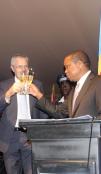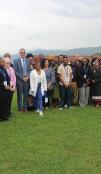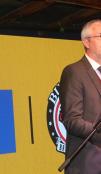Actions speak louder than words – how the EU-AU partnership really works for Africa

Europe and Africa need each other to build a solid and lasting response to global and common challenges, from climate change to peace and security or economic development that affect us all. The partnership between the European Union and the African Union, rooted in dialogue and multilateralism, is solution-oriented and forward-looking.
Europe and Africa are joint stakeholders in a multilateral, rules-based international system. The EU and its Member States were among the first to express full support for the integration of the AU within the G20; the EU supports Africa in its ambitions to become a key global player. Together, the AU and the EU can be pillars in the defence of a rules-based world, where sovereignty, territorial integrity and the right to self-determination are safeguarded.
While others seek to divide, the EU in its partnership with Africa seeks to deliver and foster cooperation. The commitments made by some countries have not stood up to the test of time. While the EU and its Member states have consistently invested in Africa and facilitated the duty free access of African exports in the EU, others only afford to invest in disinformation.
As a tangible sign of our willingness to engage in a partnership that concretely benefits Africa, 33 of the least developed African countries have benefitted from the most favourable customs regime, removing tariffs and quotas for all imports of goods – except arms and ammunition.
As of today, the EU is by far the main trade partner of the African continent, with a total volume of 268 billion Euro in 2021 (approx. 5. 225 trillion SZL) and 90% of African exports entering the European Union duty free. The EU is encouraged by the potential of the AfCFTA (African Continental Free Trade Area) and has been supporting it since the beginning, contributing, under a Team Europe (EU and Memebr States) approach, with expertise, institutional capacity and exchanges on lessons learned.
In Eswatini, the EU has directly invested around 6 billion SZL over the last 20 years, in areas such as agriculture, food security, free primary education, infrastructure, health, civil society support, to name a few. This does not even include the contributions delivered via United Nations agencies and programmes, to which the EU and its 27 Member states are the largest financial contributor, providing about a quarter of all the voluntary contributions to UN funds and programmes.
The European Union is deeply committed to the safety and prosperity of its neighbours, as it is also a condition for our own security and prosperity and we are a reliable and predictable partner. In times of rising global food insecurity, the EU stands by its commitment to facilitate the export of grain and other agricultural products from Ukraine. We would like to repeat that from day one, the EU has exempted food and agricultural inputs (including fertilisers) from its sanctions imposed on the Russian Federation. Complementary to the Black Sea Grain Initiative, the EU has set up the EU-Ukraine Solidarity Lanes through which almost 61 million tonnes of cereals leave Ukraine by land. While it is often quoted that only a minor percentage of agricultural products exported from Ukraine has reached African consumers directly, the combined economic effects of the Black Sea Grain Initiative and the Solidarity Lanes have resulted in a 23% decrease in the price index for grain on the global market.
Looking beyond the immediate need to mitigate price volatility for foodstuffs on the global market, by 2024 we will have mobilized almost 7 billion Euro (approx. 140 billion SZL) to improve food security in Africa; more than 3 billion Euro (approx. 60 billion SZL) has already been disbursed. This includes the EU’s contributions to the IMF’s Poverty Reduction and Growth Trust.
Solidarity has always been a founding value of the European Union and we stand by it – in both good times and hard times. I am proud that in Eswatini we have anticipated and started preparing for the next drought. The EU, through its humanitarian assistance arm ECHO (European Civil Protection and Humanitarian Aid Operations), the Finnish Red Cross and the Baphalali Eswatini Red Cross help provide life-saving assistance to the most vulnerable citizens in the country.
It is not the first time we work together to help those most at risk. In 2021, we provided assistance through cash-transfers to the value of SZL 9 million to assist 2 200 most vulnerable households at Hosea and Sigwe constituencies in the Shiselweni region, which translates to 13 200 individual beneficiaries. The assistance mitigated the impacts of the Covid-19 pandemic. Last year, we started a more ambitious pilot partnership programme over three years with EU funding of approximately SZL 30 million focusing on disaster risk management and crisis preparedness, addressing the food security, health and protection needs of the most vulnerable and providing livelihood opportunities in the most fragile communities.
The concrete and tangible results are here. They confirm the European Union as Africa's prime partner at all levels, on trade, investments and development. Europe has been and will remain a long-standing partner of Africa – the recent renewal of the agreement with African, Caribbean and Pacific countries, in existence since 1975, is just one more demonstration of our commitment. As agreed at the 6th EU-AU Summit in February 2022 to strengthen quality infrastructure, nearly 150 billion Euro (3 trillion SZL) of investments will be mobilized by 2027 in Africa as part of the “Global Gateway Investment” strategy. These investments are already taking place today and the European Union is translating commitments made at the Summit into reality.
On peace and security, notwithstanding multiple crises across the globe, the EU has enhanced its support to AU and African-led peace support operations. Again, this translates commitments made at the 6th EU-AU Summit into action. For the period 2022–24, 600 million Euro is being allocated to these missions via the European Peace Facility (EPF), complementing support under other development instruments. An example is EU Training Mission in Mozambique, with a 15 million Euro (approx. 300 million SZL) budget. Africa has and will continue to remain a key area of operations with EPF support. The total Team Europe’s (EU and its 27 EU Member States) commitment for Conflict Prevention, Mediation, Peace and Security initiatives at national and regional level is expected to amount to 1.5 billion Euro (30 billion SZL) from 2021 until 2027.
The EU has its share of responsibility in global warming and is investing heavily to curb emissions in Europe. It also stands by the side of the countries that are victims of or are suffering from the consequences of global warming and need support in their climate transition. We are supporting the AU’s Great Green Wall initiative for climate adaptation with 700 million Euro and are driving forces behind the decision to allocate 100 billion USD in special drawing rights (or equivalent contributions) to the most vulnerable countries, particularly in Africa. The Summit for a new global financial pact held in Paris at the end of June 2023, in which 25 African heads of states participated along with both AU and EU leadership, effectively contributed to reaching that target and has paved the way to the next Africa Climate Summit to be held in Kenya in September 2023.
In all these developments, Europe is delivering. The overall funding for development cooperation by Team Europe went up by almost 30% in 2022 worldwide, with EU assistance to Africa increasing by 11% for the period 2021–2027, when compared to 2014–2020.
While we are working on the organisation of the next Ministerial meeting between the African Union and the European Union, where we will take stock of our joint achievements to date, we wish to reaffirm our continued determination and commitment to strengthen our partnership in solidarity with Africa, with a view to contributing together to global peace, security and prosperity.
- By Dessislava Choumelova, EU Ambassador to Eswatini





